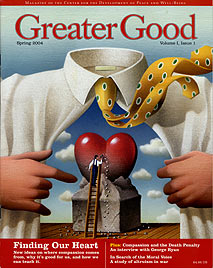Berkeleyan
A magazine about goodness and compassion
Twice-yearly publication hopes to divert the academic spotlight from anger, shame, and embarrassment
![]()
| 30 September 2004
 The debut issue of Greater Good, published by Berkeley's Center for the Development of Peace and Well-Being |
Have you ever shared the thought that “there’s no good news”? Or that violent crime and warmaking get more than their share of ink? A new magazine called Greater Good has set out to buck the trend, by providing a forum for academic research into the roots of positive emotions and peaceful relationships.
The magazine was launched in May by the campus’s Center for the Development of Peace and Well-Being. The inaugural issue of Greater Good explores the theme of compassion, with a piece by co-editor Dacher Keltner, professor of psychology, summarizing research findings on the biology of that very human emotion. An interview with former Illinois Gov. George Ryan explores his decision to commute the sentences of 167 death-row prisoners, while other articles examine the role of compassion in supportive marriages and in the midst of war, and profile community-based programs that cultivate positive human qualities and behavior.
The forthcoming fall issue, which will focus on forgiveness, includes a cover article by Bishop Desmond Tutu, winner of the Nobel Peace Prize, and a piece on the relationship between apology and forgiveness, which leads by analyzing President Bush’s apology to the Arab world for the abuse of detainees at Abu Ghraib prison.
An emotions researcher with expertise in facial expressions, Keltner says he’s paid his dues researching emotions — like fear, shame, and embarrassment — that support a pessimistic view of human nature. “Ten years ago you could do a literature search and find 3,000 studies of anger and 12 studies of gratitude,” he says. “That presents a lot of scientific opportunities.”
Research has shown the evolutionary roots of emotions like anger, he notes. But you can ask the same set of questions about positive emotions. “It turns out their story is just as interesting and requires the same rigorous scholarship — and has, in some regards, an even more complicated set of theoretical demands,” Keltner says. “Why would we have an emotion like compassion that makes you serve others? What are its biological foundations? How do you account for it in an evolutionary account of human nature?” Science has ignored these kinds of questions, he says, due to biases that see emotion in general as a female province, less “elevated” than reason, and negative emotions as meriting more serious scholarship than positive ones.
According to coeditor Jason Marsh, a grad student in the School of Journalism, Greater Good is meant to serve as a bridge between scientific researchers in psychology, education, sociology, and other fields — who are producing a growing body of literature on the roots of human goodness — and the public, especially practitioners in education, health care, and social services. It is supported by gifts to the Center, and launched with a press run of 5,000 — nearly all of which were distributed for free the first time ‘round — and is now building a base of subscribers, who pay $7.95 a year ($10.95 for two years) of the twice-yearly publication.
Some of the content of Greater Good may be found on the website of the Center for the Development of Peace and Well-being (peacecenter.berkeley.edu) — whose program includes faculty research grants, graduate and undergraduate fellowships, public lectures, new curriculum, among other activities.

